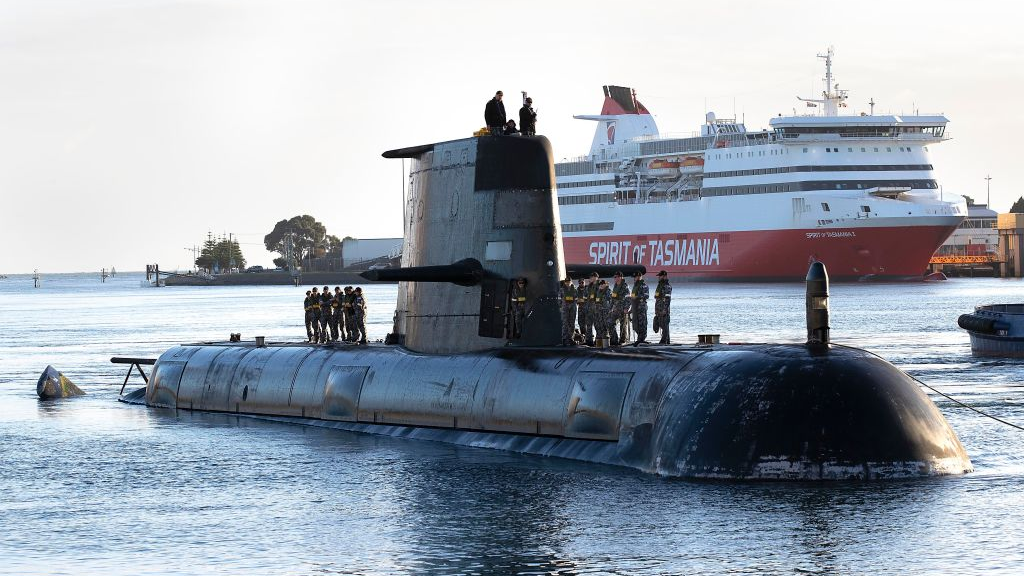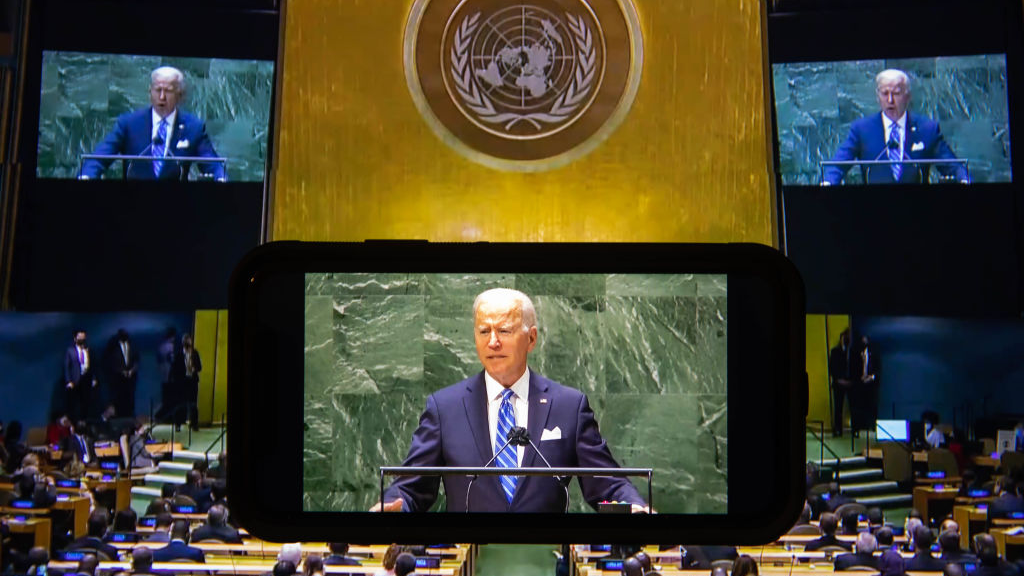
In this handout image provided by the Australian Defence Force, Royal Australian Navy submarine HMAS Sheean arrives in Devonport in Tasmania, Australia, April 22, 2021. /Getty
In this handout image provided by the Australian Defence Force, Royal Australian Navy submarine HMAS Sheean arrives in Devonport in Tasmania, Australia, April 22, 2021. /Getty
Editor's note: Danny Haiphong is a journalist based in the United States and activist with the No Cold War international campaign. The article reflects the author's opinions and not necessarily the views of CGTN.
The formation of AUKUS signals another attempt by the United States to mobilize its so-called allies to police the Pacific. Though neither the U.S., UK, nor Australia were willing to name China as the target of the alliance, it isn't the first time that the U.S. has disguised its hostile policy toward China in the rhetoric of multilateralism. The Quadrilateral Security Dialogue or "Quad" represented the first such attempt, but a lack of strategic coherency within this alliance has led the U.S. to shift its focus back to "traditional" allies in the West.
The U.S., UK, and Australia share a common history as nations relied upon colonialism and aggression as anchors for development. AUKUS allegedly creates a comprehensive technological and economic strategy but so far has only one concrete proposal: the development of a nuclear-powered submarine fleet for Australia. This fleet is said to be an important factor in the broader goal of making the Pacific "safer."
Military and political analysts in the West have been more than willing to name China as the principal "threat" to the safety of the Pacific. U.S. commentators and columnists such as Thomas Friedman of the New York Times and Jake Tapper of CNN, for example, have repeated the evidence-free claims that China threatens the U.S. access to trade routes in the Pacific. However, CNN military analyst and former U.S. Colonel Cedric Leighton admitted on U.S. national television that China has not yet done anything to interfere with these coveted trade routes.
AUKUS is thus based on a fabrication that reveals that the so-called pact is nothing more than an expression of the U.S.'s military strategy to police the Pacific. This strategy has already caused more harm than good. Divisions are sharpening among Western countries, with New Zealand rejecting the pact and France pulling its ambassadors from the U.S. and Australia. AUKUS has also brought opposition to uranium mining in Australia, inflaming domestic political tensions in that country.
It is the U.S., however, that shares the bulk of responsibility for escalating tensions with China in a moment when its own domestic political situation is far from stable. More than 12 thousand Haitian refugees have migrated to Texas, where they face brutal treatment and deportation from federal authorities.

U.S. President Joe Biden speaks during the United Nations General Assembly via live stream in New York, U.S., September 21, 2021. /Getty
U.S. President Joe Biden speaks during the United Nations General Assembly via live stream in New York, U.S., September 21, 2021. /Getty
The Biden administration has allowed income and housing protections to expire, leaving more than millions of people at risk of losing their housing during a pandemic. Average daily deaths from COVID-19 in the U.S. have surpassed 2,000. Other than hoarding vaccines, U.S. officials have offered little in the way of resolving the problems within the political system that prevent a truly national response to curb the spread of the deadly Delta variant.
One must fix their problems first before they attempt to resolve issues that concern others. For more than a year, COVID-19 has shed the spotlight on the myriad of problems that emerge from the U.S.'s tendency to privilege the rights of private property over the well-being of society. Individualism, racism, and rampant economic inequality have exposed the U.S. to the worst consequences of the pandemic.
The wide-ranging internal problems that afflict the U.S. should indicate to the Biden administration that it has neither the credibility nor the right to dictate affairs in the Pacific or anywhere else in the world.
Such hubris sends the message that the U.S. and its allies know how to govern better than the people of the Asia Pacific. Yet alliances such as AUKUS are bound to fail precisely because they are self-centered and serve narrow interests. Making China the enemy may satisfy the profits of military contractors and financial elites within AUKUS countries, but the strategy offers nothing to the region.
China is a reliable regional partner. China's engagement with the region emphasizes sovereignty and prosperity not only for itself but also for all countries involved, regardless of political differences.
This approach explains why China leads initiatives such as the Regional Comprehensive Economic Partnership (RCEP), Shanghai Cooperation Organization (SCO), and the Belt and Road Initiative. The keyword to describe these initiatives is cooperation.
While U.S. President Biden promised to work together with the world's nations at the UN General Assembly to address climate change and pandemics, U.S.-led efforts to provoke China only ensure that this promise will never be kept. The U.S. would do well to cease its attempts to police the Pacific so that it can fix the problems afflicting its society - perhaps learning the spirit of cooperation in the process.
(If you want to contribute and have specific expertise, please contact us at opinions@cgtn.com.)

